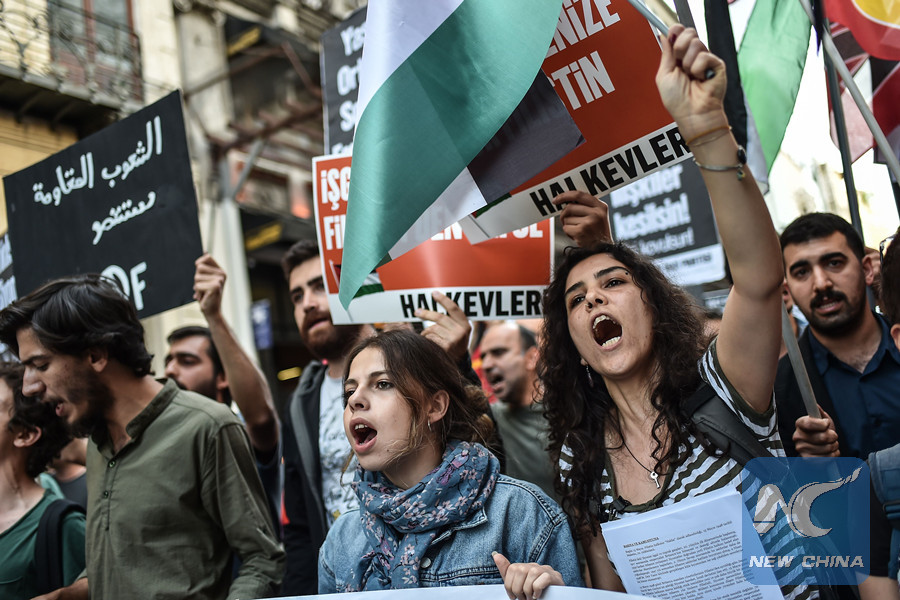
Protestors shout slogans as they march on Istiklal avenue in Istanbul, on May 15, 2018 during a protest against the killing of Palestinians by Israeli soldiers in clashes and protests. (AFP photo)
ISTANBUL, May 17 (Xinhua) -- Despite a vocal critic of Israeli killings of dozens of Palestinians, Turkey will not go so far as to impose any substantial measures against Israel, analysts told Xinhua.
"I don't expect the government to take any big concrete steps," said Hasan Koni, a professor of public international law at Istanbul Kultur University.
Top Turkish officials have denounced the violent crackdown by Israeli forces on Palestinians who protested against the relocation of the U.S. embassy from Tel Aviv to Jerusalem, calling it "state terror."
"Israel is a terror state," Turkish President Recep Tayyip Erdogan said, describing the killings as "genocide."
At least 60 Palestinians were killed and more than 3,000 others wounded on Monday by Israeli forces during protests in Palestinian towns against the opening of the U.S. embassy in Jerusalem, whose status remains a thorny issue in the Israeli-Palestinian conflict.
As a medium-sized state, Turkey would not think it wise to infuriate the U.S. and Israel, in particular when the country is scheduled to have snap parliamentary and presidential elections on June 24, argued Koni.
Turkey's ailing economy needs foreign loans as much as around 240 billion U.S. dollars in the next 12 months to pay debts and cope with a large current account deficit.
"I expect no concrete moves (from the government)," said Celalettin Yavuz, a security and foreign policy analyst. "Turkey has hardly any tools at its disposal to use against Israel."
The Turkish government has asked the Israeli ambassador to Ankara and the consul general in Istanbul to leave the country for a certain period, while recalling its ambassadors to Tel Aviv and Washington for consultations.
In the meantime, Israel has asked the Turkish consul general in Jerusalem to temporarily leave the country.
Turkey is not, economically, diplomatically or militarily, in a position to impose sanctions on Israel, said Cahit Armagan Dilek, director of the Ankara-based 21st Century Turkey Institute.
Many feel that the harsh discourse by Turkey's ruling Justice and Development Party may be largely for show, aiming at pleasing the public at home ahead of the polls.
A bill submitted by Turkey's main opposition party calling for the agreements concluded with Israel to be annulled, was rejected by the ruling party in parliament.
The Republican People's Party, the main opposition, also called on the government to permanently withdraw the Turkish ambassador to Israel rather than temporarily.
Ankara would probably only take some not-so-important steps in a bid to appeal to the public, maintained Koni.
The government would exploit the public anger toward Israel in election rallies, Dilek said, noting that the government had not walked its talk in the past regarding Israel.
Despite strained ties in the past, Turkey's ruling party did not oppose Israel's bid for membership of the Organizaion for Economic Co-operation and Development, and bilateral trade had continued to pick up significantly.
The two countries only normalized ties in 2016 following years of tension over the killings of 10 Turkish activists by Israeli commandos in 2010 on a ship trying to break the Israeli blockade of the Gaza Strip.
According to media reports in recent years, even before they mended ties, Israel had kept buying Iraqi Kurdish oil via Turkey.
Turkey has declared a three-day mourning for the Palestinians killed, and called for an extraordinary summit of the Organization of Islamic Cooperation (OIC) in Istanbul on Friday.
In addition, the ruling party has called for a mass rally in Istanbul on Friday afternoon to show solidarity with the Palestinians.
Ankara would face a harsh reaction from the U.S. if it moves to punish Israel with some sanctions, stated Koni, noting that the Jewish lobby is quite strong in the U.S.
Given the lack of unity among Islamic countries, the upcoming OIC meeting is not expected to produce any solid sanctions against Israel.
The OIC meeting is symbolically important, but would lack any deterrence due to divisions among its members, said Yavuz who teaches at Istanbul Ayvansaray University.
A previous OIC summit convened by Turkey last December, after Washington first announced its intention to relocate its embassy in Israel, produced no tangible results.
In addition, Turkey is making efforts for the Israeli violence to be discussed at a special session in the United Nations.
"We will never allow Israel to illegally seize Jerusalem," said President Erdogan.
In response, Israel has reportedly suspended import of agricultural products from Turkey.
Like many countries, Turkey favors the two-state solution to the Israeli-Palestinian conflict, with East Jerusalem as the capital of an independent Palestinian state.

